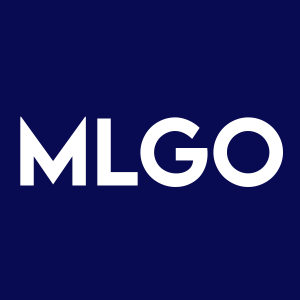MicroAlgo Inc. Announces Research on Quantum Information Recursive Optimization (QIRO) Algorithm, for Combinatorial Optimization Problems to Expand and Solve New Ideas
Rhea-AI Summary
Positive
- Development of a novel quantum computing algorithm that could provide exponential improvements in computational efficiency
- Algorithm demonstrates stronger global search capabilities compared to traditional methods
- Potential applications across multiple high-value sectors including logistics, finance, and AI
- Flexible design allows customization for different problem-solving scenarios
Negative
- Research is still in early stages with no proven commercial implementation yet
- Success depends on advancement of quantum computing technology
- No specific timeline or commercialization plan provided
News Market Reaction – MLGO
On the day this news was published, MLGO declined 13.58%, reflecting a significant negative market reaction.
Data tracked by StockTitan Argus on the day of publication.
Shenzhen, May 14, 2025 (GLOBE NEWSWIRE) -- MicroAlgo Inc. Announces Research on Quantum Information Recursive Optimization (QIRO) Algorithm, for Combinatorial Optimization Problems to Expand and Solve New Ideas
Shenzhen, May. 14, 2025––MicroAlgo Inc. (the "Company" or "MicroAlgo") (NASDAQ: MLGO), today announced the research of the Quantum Information Recursive Optimization (QIRO) algorithm, which aims to provide a new approach to combinatorial optimization problems by leveraging the power of quantum computing. The Quantum Information Recursive Optimization (QIRO) algorithm is an optimization algorithm based on quantum computers, designed to tackle complex combinatorial optimization problems. This algorithm combines the concepts of quantum computing and recursive algorithms, utilizing the parallel computing capabilities of quantum computers along with the properties of quantum state superposition and interference to rapidly find optimal or near-optimal solutions within the search space. Recursive algorithms solve problems by repeatedly breaking them down into similar subproblems, while quantum computing exploits the characteristics of qubits and quantum states to achieve exponential acceleration. The QIRO algorithm integrates these two approaches by recursively invoking the quantum optimization process, progressively reducing the problem size until the optimal solution is found.
Problem Modeling: the first step involves modeling the combinatorial optimization problem by clearly defining the objective function, constraints, and candidate elements. This step forms the foundation of the algorithm and is a prerequisite for the subsequent stages.
Quantum State Initialization: in a quantum computer, quantum states are initialized through quantum gate operations. Due to the superposition property of quantum states, the quantum computer can process multiple computational paths simultaneously, thereby enabling parallel computation.
Recursive Invocation of the Quantum Optimization Process: the core of the QIRO algorithm lies in its recursive invocation of the quantum optimization process. In each recursion, the quantum state is evolved using quantum gate operations, leveraging quantum interference to search for the optimal solution within the search space. Depending on the problem's size and complexity, the depth and number of recursive calls are set to ensure that the algorithm can find an optimal solution within a reasonable time frame.
Measurement and Result Extraction: when the recursion reaches its boundary conditions, quantum measurement is performed to extract the optimal or near-optimal solution. The measurement collapses the quantum state into a definite state, from which the solution to the problem can be obtained.
Result Verification and Optimization: the extracted solution is then verified and further optimized. By comparing the objective function values of different solutions, the optimal one is identified. Additionally, according to the actual needs of the problem, the solution can be further adjusted and refined to meet the problem’s specific constraints and objective function.
The Quantum Information Recursive Optimization (QIRO) algorithm developed by MicroAlgo demonstrates significant technical advantages in solving combinatorial optimization problems. By fully leveraging the parallelism and interference principles of quantum computing, this algorithm achieves exponential improvements in computational efficiency, enabling it to handle large-scale and highly complex optimization problems in a short time. Compared to traditional algorithms, the QIRO algorithm possesses stronger global search capabilities, effectively avoiding local optima and instead identifying global or near-global optimal solutions. Moreover, the QIRO algorithm is highly flexible in design and can be tailored and optimized to meet the specific requirements of different problems, ensuring its effectiveness and accuracy across various application scenarios. At the same time, the algorithm exhibits a degree of robustness, allowing it to mitigate the impact of noise and errors on computational outcomes, thereby enhancing reliability and stability. These technical strengths position the QIRO algorithm as a powerful tool with broad application prospects and significant development potential in areas such as logistics and distribution, financial investment, artificial intelligence, and scientific research.
In terms of practical applications, the QIRO algorithm has already shown wide-ranging potential. It holds great significance for real-world scenarios requiring combinatorial optimization, such as resource allocation and network planning. For instance, in the field of logistics and transportation, tasks like planning optimal delivery routes and allocating cargo resources often involve complex combinatorial optimization. The QIRO algorithm can assist enterprises in identifying more efficient and cost-effective solutions. Additionally, in graph theory-related problems—such as finding large independent sets—the deployment of the QIRO algorithm on neutral atom quantum processors can enable efficient search operations. This supports efforts to study graph structures and analyze network characteristics, further proving the algorithm’s practical value across different quantum computing platforms and its capacity to advance research in related academic fields.
Looking ahead, MicroAlgo’s Quantum Information Recursive Optimization (QIRO) algorithm holds immense growth potential. As quantum technology continues to progress, the quality and accessibility of quantum resources will steadily improve, providing greater support for the QIRO algorithm to tackle even more complex and large-scale combinatorial optimization problems. Furthermore, the QIRO algorithm may serve as a model for the development of additional hybrid quantum-classical algorithms, expanding the scope of quantum computing applications across various industries. This could offer new hope for solving more challenging real-world optimization problems, making QIRO a vital technological force in future scientific and technological development and a key driver of progress across multiple domains.
About MicroAlgo Inc.
MicroAlgo Inc. (the “MicroAlgo”), a Cayman Islands exempted company, is dedicated to the development and application of bespoke central processing algorithms. MicroAlgo provides comprehensive solutions to customers by integrating central processing algorithms with software or hardware, or both, thereby helping them to increase the number of customers, improve end-user satisfaction, achieve direct cost savings, reduce power consumption, and achieve technical goals. The range of MicroAlgo's services includes algorithm optimization, accelerating computing power without the need for hardware upgrades, lightweight data processing, and data intelligence services. MicroAlgo's ability to efficiently deliver software and hardware optimization to customers through bespoke central processing algorithms serves as a driving force for MicroAlgo's long-term development.
Forward-Looking Statements
This press release contains statements that may constitute "forward-looking statements." Forward-looking statements are subject to numerous conditions, many of which are beyond the control of MicroAlgo, including those set forth in the Risk Factors section of MicroAlgo's periodic reports on Forms 10-K and 8-K filed with the SEC. Copies are available on the SEC's website, www.sec.gov. Words such as "expect," "estimate," "project," "budget," "forecast," "anticipate," "intend," "plan," "may," "will," "could," "should," "believes," "predicts," "potential," "continue," and similar expressions are intended to identify such forward-looking statements. These forward-looking statements include, without limitation, MicroAlgo's expectations with respect to future performance and anticipated financial impacts of the business transaction.
MicroAlgo undertakes no obligation to update these statements for revisions or changes after the date of this release, except as may be required by law.
Contact
MicroAlgo Inc.
Investor Relations
Email: ir@microalgor.com








